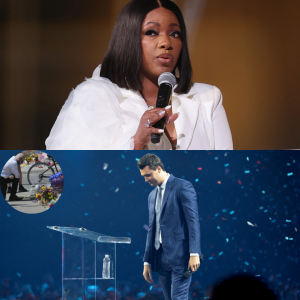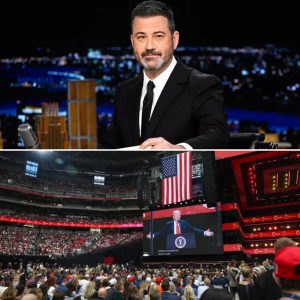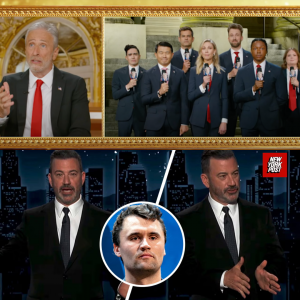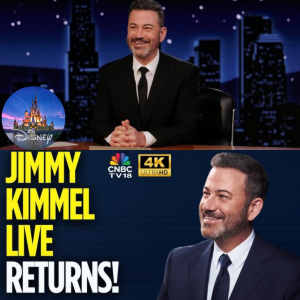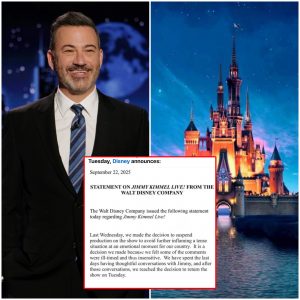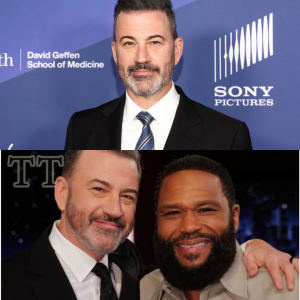The moment arrived like a thunderclap across late-night television. Jon Stewart, normally the master of measured sarcasm, stormed back onto The Daily Show stage on September 18, not for a typical Monday cameo, but as a fierce response to Jimmy Kimmel’s sudden suspension. The air crackled with tension, the audience buzzing with anticipation, and viewers at home braced themselves for a broadcast that would redefine the limits of satire, free speech, and televised outrage.
The trigger was Kimmel’s indefinite removal from ABC following his controversial remarks about the tragic death of conservative commentator Charlie Kirk. While opinions about Kimmel’s jokes had already divided the nation, Stewart’s arrival transformed what might have been a week of late-night filler into a high-stakes cultural battleground.
Opening the segment with a golden, Trumpian set design — a mocking echo of Mar-a-Lago excess — Stewart immediately signaled that this was no ordinary episode. With razor-sharp wit, he dubbed President Donald Trump “perfectly tinted,” eliciting both laughter and uncomfortable gasps from the studio audience. The joke, dripping with irony, was a statement about power, control, and the chilling new rules governing free expression.
Stewart didn’t stop there. He pivoted to the heart of the issue: the redefinition of free speech in America. “Our great administration has laid out very clear rules on free speech,” he quipped, voice thick with sarcasm. “Now, some may argue this is a clever ruse to obscure power consolidation… but no sir, I think it’s great.” Laughter mixed with tension — Stewart had made the invisible chains of censorship suddenly visible.
The timing could not have been more dramatic. ABC had suspended Kimmel after FCC Chairman Brendan Carr hinted at potential regulatory action, while major affiliates threatened to yank the show. The network’s decision, ostensibly about “community standards,” had quickly become a lightning rod for debates over corporate pressure, government overreach, and the politicization of comedy. Stewart’s monologue amplified that debate, turning jokes into a political battleground.

Across social media, reactions exploded. Hashtags like #StandWithKimmel and #FreeSpeechIsDead trended within hours. Viewers were polarized: some cheered Stewart’s courage to confront what they saw as governmental intimidation; others accused him of opportunism, exploiting tragedy for ratings. One Twitter user fumed, “This isn’t comedy, it’s theater of chaos!” while another countered, “Finally, someone daring enough to call out the censorship!”
The spectacle also drew comparisons with other late-night titans. Stephen Colbert, David Letterman, and even pundits in the political sphere weighed in, warning that silencing Kimmel was not merely about one monologue — it was a harbinger for the erosion of dissenting voices in entertainment. Stewart’s performance, a combination of humor, venom, and moral clarity, served as a rallying cry for free expression in an era where every joke is dissected for political consequences.
Behind the laughter, however, lay a sobering truth. Stewart’s parody underscored a nation at odds with itself: a society grappling with the boundaries of speech, satire, and accountability. The irony was bitter — comedy, once a safe haven for challenging power, had become a minefield where one misstep could silence even the most seasoned performers.
By the show’s closing, Stewart’s grin masked a warning: if free speech becomes conditional, no comedian, journalist, or citizen is immune. America laughed, yes — but the unease lingered, a reminder that satire is now a high-stakes battlefield, and every punchline carries weight far beyond the studio walls.
As debates rage across dining tables, offices, and digital feeds, one question looms larger than any joke: can comedy survive in a world where power dictates which voices are heard — and which are silenced? Stewart didn’t answer it outright, but the nation knows: the war over free speech has only just begun.


